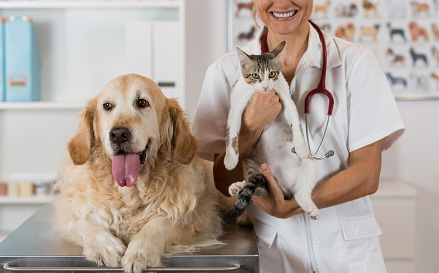Pet Vaccines

Many pet owners question whether or not to vaccinate their four-legged family members. The idea behind vaccination is to use a foreign substance called an antigen (virus or bacteria) to trigger the immune system to build a protective antibody response, so that when the body encounters that antigen again in the future it can protect itself. Vaccines use killed bacteria (or parts of bacteria) and attenuated or modified-live viruses. Attenuation is the process of modifying a virus so it is less likely to cause disease, but is still able to stimulate an immune system response. Nothing has benefited mankind and animal kind more than vaccination.
Vaccines Protect Against Disease
For our pets, vaccination is central to their lifelong health maintenance. Our pets put their noses everywhere, sniffing and tasting everything. This allows bacteria and viruses, many of which are maintained in the wildlife, stray dog and stray cat populations, to invade – leaving our pets susceptible to disease.
Vaccines are started at a young age because the young are most susceptible to disease as maternal antibodies they received in utero or from nursing begin to wane. These maternal antibodies begin to decline at different ages in each puppy and kitten so initial vaccines are given in a series to overlap the loss of maternal antibodies with their immune system’s production of new ones.
Available Pet Vaccines
There are many vaccines available. For dogs and cats there is a core group of vaccinations that every pet should receive. For dogs, these are distemper, parvovirus, canine hepatitis, leptospirosis, and rabies. Non-core vaccines include Lyme, kennel cough, and canine influenza. For cats, vaccination against panleukopenia (Feline distemper), feline calicivirus, feline herpes virus (Rhinotracheitis) and rabies are core vaccines. Feline leukemia, Bordetella, chlamydia and feline immunodeficiency virus are other optional considerations. The choice of vaccines and their timing is a conversation best had with your veterinarian and is based on age, medical history, and your pet’s lifestyle.
Vaccine Safety
Recent years have seen controversy about the safety of vaccines. While there is no perfect vaccine available, vaccines have never been safer than they are today. The vast benefit of vaccination far outweighs the small risks. While most pets have no adverse events associated with vaccination, a small number can have mild post-vaccination symptoms. They usually occur in the first one to two days after vaccination and are a normal consequence of immune system stimulation. They include:
- Discomfort or swelling at the injection site
- Mild fever
- Decreased appetite or activity
More serious and rare reactions can occur within minutes to hours after vaccination. These are allergic reactions and can be potentially life-threatening. If you see any of the signs, seek veterinary care:
- Vomiting and or diarrhea
- Itching or hives
- Swelling of the muzzle, eyes or face
- Cough or difficulty breathing
- Collapse
Any swelling or nodule under the skin at the injection site that does not go away after three weeks or continues to enlarge should be reported to your veterinarian. Always inform your veterinarian if your pet has ever had a severe vaccine reaction.
Pet Long-term Health
Remember, your pet’s long-term health is a team effort and involves an open discussion of vaccines and vaccination timing between you and your pet’s veterinarian.
